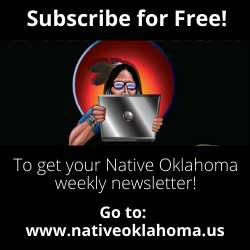

More Native Art, Film and Political Recognition for Oklahoma Tribes in 2024
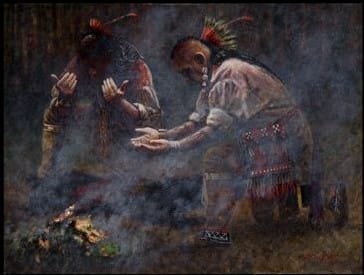
by Ryann Gordon
2023 was a triumphant year for Natives in Oklahoma. Native Americans hit the map on a national scale in categories across culture, most certainly in that of film. Though the ongoing feud with Oklahoma Governor Kevin Stitt rages on, Native American politics have gained positive attention that will hopefully grow favorable results for tribal governments across the state and others in 2024.
Aside from art, Oklahoma’s made national headlines politically, probably more in the year to come. Governor Stitt’s eroding relationship with tribal leaders tempted damage to the relationship between the state and tribes, one that leaders have nurtured for decades to maintain, causing many state leaders to stand up for the tribal nations and rebuke Stitt’s animosity. If Stitt’s actions continue to push against tribal governance, legislators have threatened removing compact negotiations from the governor’s office. His public attempt to re-control Native lands and rights could prove beneficial for tribal governance in 2024.
Oklahoma Natives have big things coming in other greater feats, some might say, more recognizable than politics. In film, Native culture has become widely recognized and sought after in the mainstream, as Reservation Dogs and Killers of the Flower Moon took the front row in American film in 2023. While KOTFM shined Hollywood light on the traumatic past of one of Oklahoma’s Native tribes, Res Dogs introduced America to countless indigenous stories and inside jokes, and brought their vibrant folklore to life in a way that was heartfelt, heartbreaking, at times, and entertaining above all. The first series to be filmed entirely in Oklahoma, Res Dogs also was the first to feature all indigenous writers and directors.
A breakthrough for Native film, these two productions brought unprecedented success and attention to Oklahoma Native Americans, bringing indigenous culture and historical hardships into the minds and hearts of the American mainstream. Native film in Oklahoma has continued to skyrocket since, expanding into projects that will continue to grow in 2024 and beyond. Not only have Oklahoma Natives like Sterlin Harjo joined the ranks in Hollywood, but Native-run production teams have become a staple in Oklahoma and immensely sought after in the film industry for location-based productions.
Native films continue to come out on high-streaming platforms like Frybread Face and Me, recently released on Netflix, and others soon to come in 2024: Rez Ball, about reservation basketball, co-written by Harjo, produced by Lebron James; AMC’s Outer Range season 2; and Echo, about Marvel’s first Native American superhero, Maya, who seeks redemption in her Oklahoma hometown.
Not just in Oklahoma, but around the world—Native culture is on the comeback. There’s no better time to connect with the grassroots that enrich the culture that we live in, Native or not, in Oklahoma. Over the year to come, there are growing numbers of events locally to enjoy and represent Native culture.
Start the year with a New Year’s celebration at the 71st Annual Oklahoma City Powwow on January 6. The 2nd Annual MMIP (Missing and Murdered Indigenous People) Central Oklahoma Chapter Benefit Gourd Dance is on January 13, 2024 in Seminole, Oklahoma. Then the 27th Annual Myaamia Winter Gathering is a winter storytelling event that will take place in Miami, OK on January 26-27, 2024; and the OU American Indian Alumni Society Benefit Powwow on January 27, 2024 at Thunderbird Casino in Norman, OK.
Featuring more than 1,000 indigenous artists, the Red Earth Native American Cultural Festival will return the weekend of March 22-24 in OKC, followed by the IndigiPopX Indigenous Pop Expo with returns to Oklahoma April 12-14, in OKC, with a new theme: “Revolution.” The Chickasaw Nation will host their Artesian Arts Festival in Sulphur, OK on April 13, 2024, and the Mvskoke Art Market will commence at River Spirit Casino in Tulsa on April 20-21, 2024.
Gather for a powwow of art, dances and a tribal princess crowning at the Tonkawa Tribal Powwow, June 28-30, 2024. The OIGA (Oklahoma Indian Gaming) Conference and Trade Show will be held in OKC August 12-14. And see a gathering of tribes at the Standing Bear Powwow, held annually in Ponca, OK, this year, the final weekend of September, 2024.
November as always, provides a special time with Native American Heritage Month, Native American Indian Heritage Day falling on November 29, 2024, the day after Thanksgiving, yearly. More events to look for in 2024 include the Southeastern Art Show and Market, Cherokee Art Market and others.

National American Indian Veterans organization set to receive federal charter

Native vets will now have direct access to federal resources and services
by Braden Harper, Mvskoke Media
MVSKOKE RESERVATION – After two decades of hardwork and patience, U.S. Senate Bill 1725, which will grant a federal charter to the National American Indian Veterans Inc. (NAIV) will now be signed into law by President Joe Biden in January. The bill was initially introduced by Senator Mike Rounds from South Dakota in May 2021. In November 2022, the bill passed unanimously through the U.S. Senate. On Dec. 15 in a statement from Senator Rounds’ Office it was announced that the bill was passed as part of the National Defense Authorization Act (NDAA) for Fiscal Year 2024.
Mvskoke veteran and advocate Michael Coon helped push efforts to get the bill passed. His involvement stems back five years when NAIV National Commander Don Loudner (Hunkpati Sioux) invited Coon to become a region five commander that would represent the 39 tribes in Oklahoma, along with Kansas, Missouri, Arkansas and Texas. Upon invitation, Coon accepted the high responsibility of serving Native vets in his region.
Loudner is a Korean War veteran from Sioux Falls, South Dakota. Currently 91 years old, friends and family are unsure how much time he has left to live due to failing health. Brothers in arms like Coon have been praying that Loudner would be physically strong enough to travel to Washington D.C. to see SB 1725 signed by the president. This would be a crowning achievement of Loudner’s life work serving Native veterans.
According to Coon, SB 1725 has been in the works for 20 years with Loudner supporting it every step of the way. Loudner and Coon, along with many other Native vets from across the nation worked tirelessly to get the NAIV federally chartered. Finally, in 2021 Senator Rounds and Senator Ben Ray Luján from New Mexico introduced legislation before the senate.
Coon had also worked with Senator Markwayne Mullin, Senator James Lankford and former Senator Jim Inhofe regarding the NAIV federal charter. Coon feels that while military veterans get proper recognition in society, Native vets do not always get the same recognition.
“I was so thrilled for our veterans across the nation because we’re the highest ethnic group to serve in the nation. I think it’s time we finally get recognized and that our veterans get what they deserve,” Coon said. “All veterans get recognized but as far as the Native Americans they always seem to leave us out.”
According to Coon, the charter will better help all Native vets, regardless of their residential status. This means that Native veterans that live outside of the jurisdictional boundaries of their tribe will still have access to benefits and services through the new charter.
Native American Indian Veterans Inc.
NAIV is a nonprofit organization that serves Native American veterans in 14 regional offices across the United States. According to the U.S. Department of Veteran Affairs, there are currently over 140,000 Native Americans veterans in the United States. As an ethnic group, Native Americans have the highest record of military service, five times the national average. The United States has granted charters to other ethnic-specific veteran groups, however this is the first Native American veteran organization to receive a charter.
“Native Americans serve in our nation’s military at five times the national average, and this charter gives them the recognition they truly deserve and have earned,” Senator Rounds said. “The NAIV works closely with Tribal Veterans Service Officers to make certain Native American veterans receive proper benefits and resources. Congress regularly looks to the NAIV for input when addressing issues facing Native American veterans. This charter will help give the NAIV a larger platform to continue advocating for and serving the more than 140,000 Native American veterans living in the United States. I am pleased to have had it included as part of this year’s NDAA.”
The bill has been supported by a number of Native American tribes, including the Cheyenne River Sioux Nation, Oglala Sioux Nation, and the Inter-Tribal Council of the Five Civilized Tribes of Oklahoma.
“Native veterans have served our country from Valley Forge to Afghanistan and with this action, Congress has shown Native American veterans past and present the respect that is so well earned.” Loudner said.
Coon is currently seeking funding from the MCN National Council to go to Washington to see the bill signed by President Biden in person with Loudner. Coon’s trip is in need of funding for airfare and lodging. Coon also requested thoughts and prayers for Loudner during this time so that he would be able to attend the official signing himself.

ICYMI - 'We're reclaiming what we believed was ours to begin with': Tonkawa tribe buys Sugarloaf Mountain
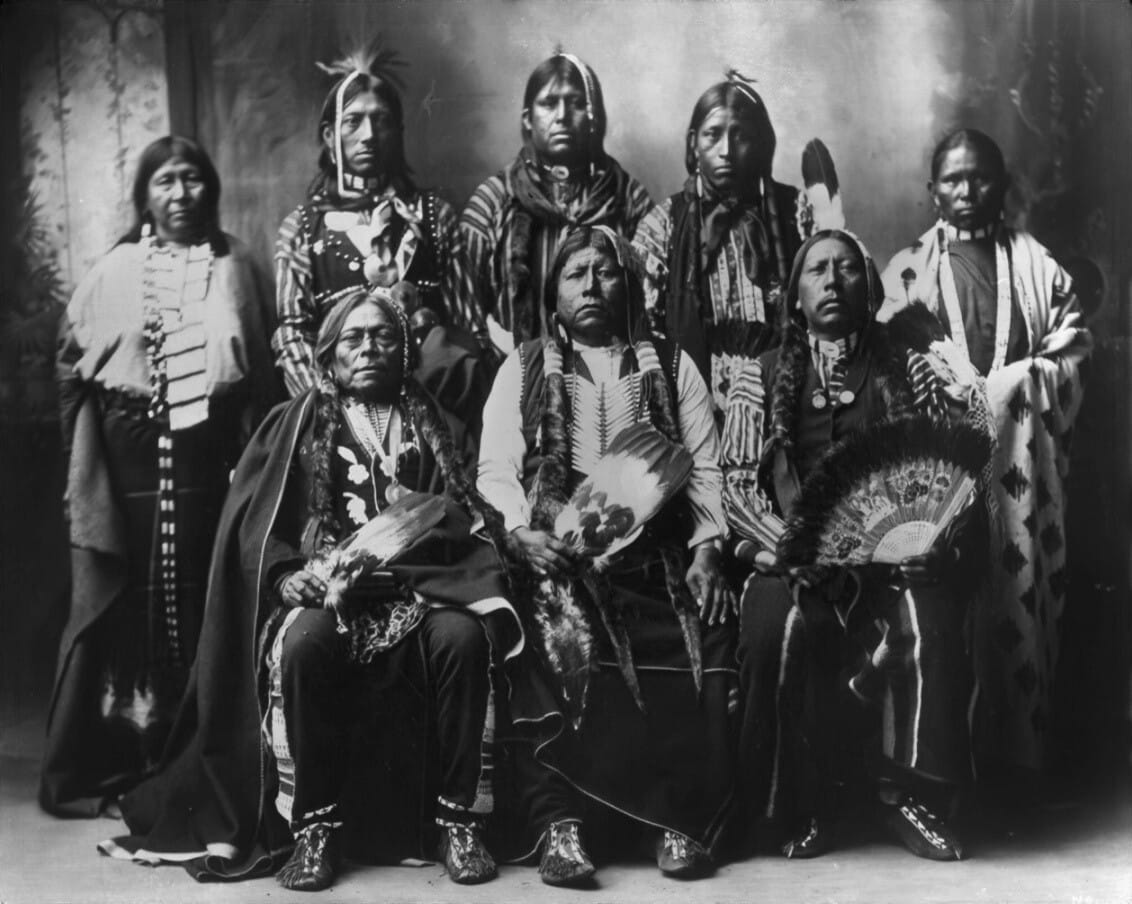
By: Brieanna Smith
This Article was posted in December
GAUSE, Texas — Don Patterson is 85-years-old, and he's never seen his tribe—the Tonkawa tribe—on the land they originated until now.
They finalized the purchased of Sugarloaf Mountain Tuesday afternoon (December 12th)
at a ceremony.
But getting the land back wasn't easy.
The Tonkawa tribe roamed the Central Texas plains for hundreds of years, protecting their sacred lands and serving as scouts with the Texas Rangers during the Indian Wars.
The mountain served as their home, part of the El Camino Real or The King's Highway until 1790 and as a pathway for escaped slaves.
But the Tonkawa were forced to leave their land as more American settlers moved west in an event known as the "Trail of Tears."
They settled in northern Oklahoma and were promised a piece of their land by Governor J.W. Throckmorton in 1866—but they never received it.
In their new home, they continued their traditions, performing traditional "Wolf Dances" and telling stories about their origin.
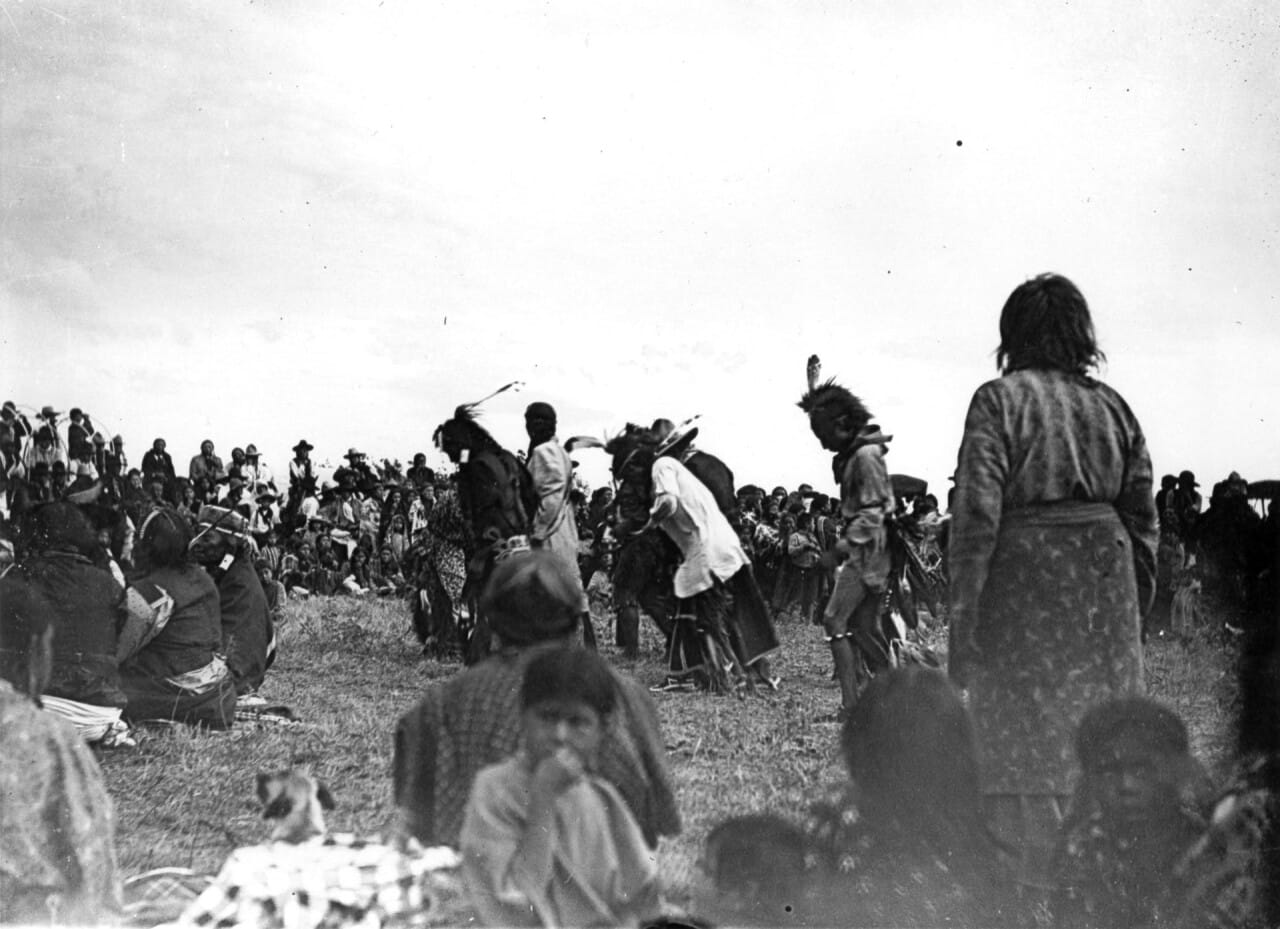
In the early 1980s, Patterson rediscovered the mountain and planted the initial seed toward the purchase.
"In the Tonkawa legend, they say this is where creation began and the Tonkawa people were the very first, so the Tonkawa tribe inhabited this land for a millennium," Patterson said.
Meanwhile in Gause, resident Dave Cunningham advocated for the mountain's preservation since 1995, but he couldn't convince Texas Parks and Wildlife to buy the site.
Therefore, he sought help from landowners Leon and Kay Herzog who bought the land surrounding the mountain.
A documentary team in Austin, who began filming the tribe in 2021, learned about the efforts and connected Tonkawa Tribal Chief Russell Martin with the couple who negotiated a deal to purchase 60 acres of the property.
"Like any other land purchase, it's a lot of paperwork and negotiation, so it took several months before it became a reality," Patterson said.
To this day, there are at least 900 members of the tribe still in Oklahoma.
But Sugarloaf Mountain, what they call "Natan Samox" or "Red Mountain" will always be home.
With help from non-profit organization, El Camino Real de los Tejas National Historic Trail Association, they are planning to dig for artifacts and transform the land into a historical park in years to come.
Steven Gonzales, executive director of El Camino Real de los Tejas National Historic Trail Association, said this purchase is the first of its kind in Texas.
"It's a place where all of these people have known about it for years and have different kinds of history with and for the first time ever it will be fully-accessible to the community," Gonzales said.
He said now the tribe can share its history and preserve the land permanently.
Gonzales announced the plan at the ceremony where Milam County commissioners, Milam County Historical Commission leaders, tribal leaders, and community members attended.
But the ceremony didn't mean much to Patterson.
He just knows the land of his ancestors is back where it belongs.
"Basically, we're reclaiming what we believed was ours to begin with," Patterson said.
Artists praise Hushtola' Art Market
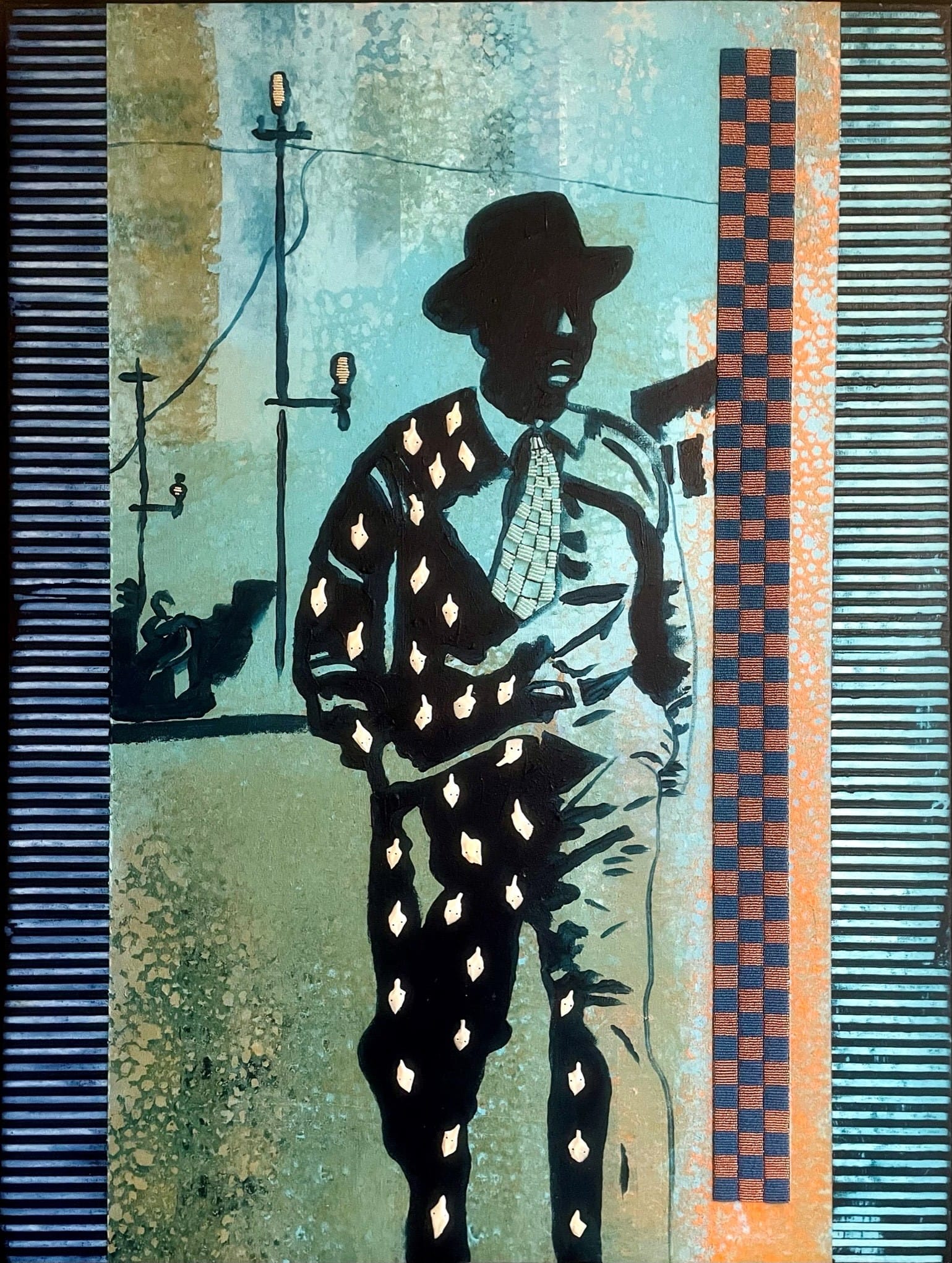
THACKERVILLE, Okla. – A husband and wife jewelry making team from the New Mexico Pueblo of Zuni tribe were awarded “Best of Show” by judges at the Chickasaw Nation’s Hushtola' Art Market.
More than 100 artists contributed works to the show, conducted at WinStar World Casino and Resort Dec. 9-10.
Raylan and Patty Edaakie took Best of Show and also finished first in the 3-D competition with jewelry pieces reflecting their Southwestern tribal roots.
Many Chickasaw artists finished in top places in categories, including Norman-based artist Billy Hensley for a mixed-media painting and Chickasaw artist Jimmy Dean Horn. Horn, from California, finished in third place in mixed media.
“The selection of artists was great, and there was a wide variety of fantastic artworks available to art patrons,” Mr. Hensley noted. “The show is new and has the potential to be a wonderful holiday shopping experience. I know I purchased a number of wonderful things from other artists from beadwork to pottery as gifts this year.
“The piece I won with is called ‘Finding My Way to the Past,’ mixed media acrylic painting embellished with handstitched glass beadwork and gar scales,” he added.
Hensley has expanded his offerings to include alligator gar scales on paintings, jewelry and leather works.
Both Hensley and Horn have displayed their talents in art galleries located in the United Kingdom and Portugal, respectively.
Chickasaw artist Brian Landreth said he enjoyed Hushtola' Art Market and praised the show’s management.
“The culture and humanities department did a wonderful job with the market, and the location was beautiful. The department did a great job providing direction to the market in WinStar. I sold a few small works and prints, and got to network with my fellow artists, which is something I always enjoy. WinStar staff were also excellent in providing support to the artists,” Mr. Landreth noted.
The art show also saw Landreth become acquainted with a relative. “A cousin’s wife saw (an article) in the Chickasaw Times and wanted to connect with me about our family and its history. I’ll be sending her some photos I have of our elders for her husband and family to have access to,” he said.
Tribes from vastly different locales graced the show. Two Southwestern tribes – Pueblo of Zuni and San Felipe Pueblo – joined the juried art show, as did Caddo, Navajo and Coushatta Nation of Louisiana tribal artists.
Chickasaw artists were awarded first place in 10 judged categories. They include Jennifer Hicks, pottery; Mary Wilds, handwoven textiles; Melissa Freeman for general textiles and traditional dress and regalia; Glenda Dewbre, miniatures; Michael Cornelius, instruments; Marcella Yepa, traditional pottery; Jim Keel, cultural diversity; Regina Free, drawing and sculpture; and Hensley, mixed media.
